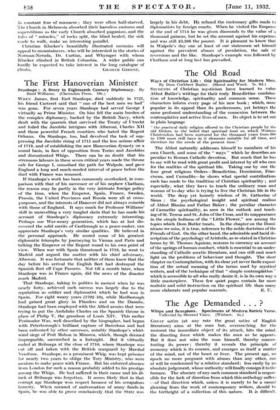The First Hanoverian Minister
Stanhope : A Story in Eighteenth Century Diplomacy. By Basil Williams. (Clarendon Press. 18s.) Witxx James, first Earl Stanhope, died suddenly in 1721, his friend Carteret said that "one of the best men we had" was gone. For seven years Stanhope had served George I virtually as Prime Minister. On him fell the main burden of the complex diplomacy, backed by the British Navy, which dealt with the quarrels that survived the Treaty of Utrecht and foiled the Jacobite intrigues with Alberoni, Charles XII and those powerful French courtiers who hated the Regent Orleans. On Stanhope, too, had devolved the task of sup- pressing the Jacobite rising of 1715 and the less serious affair of 1719, and of establishing the new Hanoverian dynasty on a sound basis, in face of opposition from Tories and Jacobites and discontented Whigs. There can be no doubt that his strenuous labours in these seven critical years made the throne safe for George I, smoothed the path for Walpole, and gave England a long and much-needed interval of peace before the duel with France was resumed.
• If Stanhope's work has been commonly overlooked, in com- parison with that of his successor or of his nephew Chatham, the reason may lie partly in the very intricate foreign policy of the time, when the Emperor, Spain, France, Sweden, Prussia, the United Provinces and Russia were all at cross- purposes, and the interests of Hanover did not always coincide with those of England. It says much for Professor Williams' skill in unravelling a very tangled skein that he has made his amount of Stanhope's diplomacy extremely interesting. Perhaps our War-weary generation, which has at last dis- covered the solid merits of Castlereagh as a peace-maker, can appreciate Stanhope's very similar qualities. He believed in the personal approach. He scored some of his greatest diplomatic triumphs by journeying to Vienna and Paris and talking the Emperor or the Regent round to his own point of view. When war with Spain threatened in 1718, he went to Madrid and argued the matter with his chief adversary, Alberoni. It was fortunate that neither of them knew that the day before his arrival the English fleet had destroyed the Spanish fleet off Cape Passaro. Not till a month later, when Stanhope was in France again, did the news of the disaster
reach Madrid: •
That Stanhope, taking to politics in earnest when he was nearly forty, achieved such success was largely due to the reputation as soldier and diplomatist which he had won in Spain. For eight weary years (1702-10), while Marlborough had gained great glory in Flanders and on the Danube, Stanhope had been employed with the Allied armies that were trying to put the Archduke Charles on the Spanish throne in place of Philip V, the grandson of Louis XIV. This earlier Peninsular War, well described by the biographer, had begun with Peterborough's brilliant capture of Barcelona and had been enlivened by other successes, notably Stanhope's whirl- wind 'siege of Port Mahon in Minorca, which, though deemed impregnable, succumbed in a fortnight. But it virtually ended at Brilluega at the close of 1710, where. Stanhope was cut Off and taken with the British rearguard by Marshal Vendome. Stanhope, as a prominent Whig, was kept prisoner for nearly two years to oblige the Tory Ministry, who were anxious to make peace with France. But his enforced absence from London for such a reason probably added to Isis prestige among the Whigs. Be had suffered in their cause and-his ill- luck at Brihuega was forgotten. It seems likely that in that corrupt age Stanhope won respect because of his scrupulous honesty. When accused . of malversation of army- funds:in Spain, he was able to prove conclusively. that the State *us largely in his debt. He refused .the customary gifts made to diplomatists by foreign courts. When he visited the Emperor at the end of 1714 he was given diamonds to the value of a thousand guineas, but he set the amount against his expenses and was still £8,266 the poorer. It is pleasant to know that in Walpole's day one at least of our statesmen set himself against the prevalent abuses of peculation, the sale of reversions and the like. Stanhope's example was followed by Chatham and at long last has prevailed,


































 Previous page
Previous page